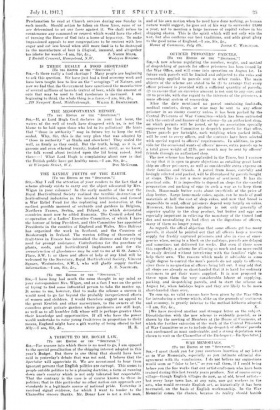OFFICER PRISONERS' PARCELS.
[To THE EDITOR or THE " SPECMOR:1
Sur,—A new scheme regulating the number, weight, and method of despatching of parcels for officer prisoners has been issued by the War Office, and will come into operation on August 1st. In future such parcels will be limited and subjected to the rules and censorship applied to parcels sent to other ranks. The main objects of the scheme are stated to be (I) to arrange that every officer prisoner is provided with a sufficient quantity of parcels; (1) to ensure that an excessive amount is not sent to any one; and (3) to provide, with due regard to the interests of the prisoners, a more efficient system of censorship.
After the date mentioned no parcel containing foodstuffs, medical comforts, drugs, or wino may be sent to any officer prisoner in an enemy country unless it has been packed by the Central Prisoners of War Committee—which has been entrusted with the control and finance of the scheme—by an authorised shop, on which permits will be issued, or by an association specially empowered by the Committee to despatch parcels for that office. Three parcels per fortnight, each weighing u-lien packed 191b., will be sent to every officer, and the contents have been selected with special regard to officers' requirements. Iu addition, to pro- vide for the occasional wants of officers' messes, extra pamels up to a total gross weight of 22 lb. per mouth may be sent by officers' friends through an authorized shoe.
The new scheme has been applauded in the Times, but I venture to say that it is open to grave objections as entailing great hard- ship on officer prisoners, as well as considerable extra expense on their families and friends. A parcel from home, carefully and lovingly selected and packed, will be ill-replaced by parcels bought at shops. This is not a mere matter of sentiment. It has its practical side. It is impossible to depend on shops for the careful preparation and packing of eggs in such a way as to keep them fresh. Homemade butter costs about two-thirds of the price of shop butter. Large home-made cakes, again, can be made of good materials at half the cost of shop cakes, and now that bread is impossible to send, officer prisoners depend very largely on cakes. Moreover, tins home-made produce is not only generally of superior quality to the shop product, but butter and eggs are especially important in relieving the monotony of the tinned food diet and neutralizing its had effect on the digestions of officers, many of them no longer young,.
As regards the offical objection that some officers get too many parcels, it should be pointed out that all officers keep a reserve supply for freshly captured prisoners and also in case of emer- gencies when, owing to a block on the railWays, parcels are delayed and sometimes not delivered for weeks. But even if there were this superfluity, a scheme for allowing so much and no more could be easily devised without interfering with the families' right to help their own. The reasons which made it advisable in some slight degree to control the men's parcels do not apply to officers. since there is no question of officers being left out. I may add that all shops ere already so short-handed that it is hard for ordinary customers to get their wants supplied. It is now proposed to throw upon them the very considerable labour of supplying, packing, and despatching parcels, and to start the scheme on August 1st, when holidays begin and they are likely to be more short-handed than ever.
To sum up, no valid reasons have been given by the War Office for introducing a scheme which, alike on the grounds of sentiment and economy, is greatly inferior to the method hitherto adopted.
We have received another and stronger letter on the stilMmt. Dissatisfaction with the nee- scheme is evidently general, as is shown by the meeting of Members at pie House of Commons, at which the further extension of the work of the Central Prisoners of War Committee no as to include the despatch of officers' parcels was condemned as most undesirable, and a strong deputation wan chosen to wait on the Chancellor of the Excliequer.—Eo.Spectator.]


























 Previous page
Previous page